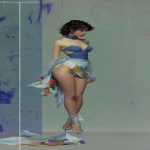Explore the Best AI Image Gallery

Quantum Computing Breakthroughs: Unleashing Creativity and Ethical Frontiers
As we stand on the threshold of a new technological revolution, quantum computing promises to redefine innovation across various sectors. With its ability to solve complex problems at an unprecedented speed, quantum computing is poised not only to revolutionize industries like finance and healthcare but also to foster creativity in the arts and culture. This blog will explore the recent breakthroughs in quantum computing, its potential applications in the creative sector, as well as the ethical dilemmas that arise in this frontier and future trends to anticipate.
What is Quantum Computing?
Quantum computing is a type of computation that utilizes the principles of quantum mechanics, focusing on the behavior of matter and energy at the atomic and subatomic level. Unlike classical bits, which can either be 0 or 1, quantum bits or qubits can exist in multiple states simultaneously due to superposition. This unique property enables quantum computers to process vast amounts of information simultaneously, leading to significantly increased processing power for certain tasks.
Recent Breakthroughs in Quantum Computing
Recently, there have been significant milestones in the development and application of quantum technologies:
- Google's Sycamore Processor: In 2019, Google claimed to achieve "quantum supremacy" with its Sycamore processor, which performed a specific calculation exponentially faster than the best supercomputers available.
- IBM Quantum Experience: IBM has made strides in democratizing access to quantum computing through its cloud platform, enabling researchers and developers to experiment with quantum algorithms.
- Quantum Encryption: Advances in quantum encryption have led to more secure communication methods, promising a future where privacy is significantly enhanced.
Impact on the Creative Industry
With its capacity for rapid data analysis and complex problem-solving, quantum computing could have far-reaching implications for the creative industry.
Art and Design
Imagine artists using quantum algorithms to analyze vast datasets of art history, generating entirely new styles and templates. Quantum computing could open avenues for creative solutions that blend diverse artistic movements into innovative pieces. This technological capability could lead to the creation of virtual galleries powered by quantum machines, offering immersive and interactive experiences.
Film and Multimedia
In filmmaking, quantum computing could streamline processes such as scriptwriting and CGI rendering. The technology could analyze audience preferences at a granular level, aiding filmmakers in crafting more engaging narratives tailored to their audience’s emotions.
Gaming
The gaming industry stands to gain tremendously, as quantum computing can create dynamic game worlds that evolve in response to player choices much like an intelligent being, providing an unprecedented level of engagement and interaction.
Ethical Considerations
As with any groundbreaking technology, quantum computing raises significant ethical questions. These include:
- Data Security: With the power to break existing encryption methods, the potential misuse of quantum computing for malicious purposes presents a critical concern.
- Access and Inequality: The disparity between those who can afford and effectively use quantum technology versus those who cannot could lead to greater social inequalities.
- Creativity vs. Originality: As quantum computing enables more collaboration between AI and human creators, the fine line between artificial creativity and human artistry may become blurred.
Future Trends
Looking ahead, several trends in quantum computing will shape its role in the creative landscape:
- Collaborative Platforms: There will likely be an increase in cloud-based quantum computing platforms that allow artists, designers, and developers to collaborate seamlessly.
- Interdisciplinary Innovation: As quantum computing integrates into various disciplines, we can expect hybrid projects that merge art, science, and technology, leading to new forms of expression.
- Focus on Ethics: As quantum technologies develop, so too will the conversations around ethics, including responsible use, inclusivity, and accessibility.
Conclusion
Quantum computing is not just a technological innovation; it is an invitation to expand our understanding of creativity, ethics, and collaboration. As researchers continue to unlock its vast potential, the creative industry has a unique opportunity to embrace these advancements proactively. The question remains: how will we navigate this new landscape, balancing innovation with ethical responsibility?





![**An illustration for a children's book, a flat illustration, referencing the style of the illustration artist [Steve Scott], featuring a child observing through binoculars, surrounded by lush greenery. There are giraffes, red pandas, golden monkeys, and sloths in the zoo. The cartoon characters are colorful, detailed, and have cheerful expressions. The U-shaped circular composition leaves a large area of irregular white in the center of the image, with a white background, and the colors are mainly blue-green tones, dark and light greens, bright yellow, and light blue. 4K, --ar 14:19** - <@409716268476923920> (fast)](https://images.ai-img.art/thumbnails/150/f7f4dfc06927f084cf3277fec1380e32e0f5c1359a51209e67492f856f846e94.webp)
](https://images.ai-img.art/thumbnails/150/d997ee4d2cd1c791b505702e03104d200fede2441ee29e1659ab59e2f3aca4ed.webp)
](https://images.ai-img.art/thumbnails/150/db2fc881b19c46daa0ba4bc3fbfe6817ed70a065de8966846b290671e5501f04.webp)
![**An illustration for a children's book, a flat illustration, referencing the style of the illustration artist [Steve Scott], featuring a child observing through binoculars, surrounded by lush greenery. There are giraffes, red pandas, golden monkeys, and sloths in the zoo. The cartoon characters are colorful, detailed, and have cheerful expressions. The U-shaped circular composition leaves a large area of irregular white in the center of the image, with a white background, and the colors are mainly blue-green tones, dark and light greens, bright yellow, and light blue. 4K, --ar 16:9** - <@409716268476923920> (fast)](https://images.ai-img.art/thumbnails/150/7af3ac8044d36e3f388e7f2cee2b294e2dd31cab56e2b9200e8155e1be52b30e.webp)


](https://images.ai-img.art/thumbnails/150/12369918f859b43a62a1fde6574b481f5112a0eefd99382396175de679fdc64d.webp)


](https://images.ai-img.art/thumbnails/150/f38b17567a3b811999da835acaa44d705f54d98a680360f167afef7e25d28846.webp)





](https://images.ai-img.art/thumbnails/150/30fa4be7616c50a12320edde5db0f654059f87492aef45341f9474ecdd333e36.webp)


](https://images.ai-img.art/thumbnails/150/0af04f7124610817e3eed56b7ff2ca49a72155dae5d805176777dafaaf20d3bb.webp)



](https://images.ai-img.art/thumbnails/150/8331be2572f65e90f86f214e403b328517538bcd3a234119ec0d6116f13b1407.webp)



](https://images.ai-img.art/thumbnails/150/2e33a00c18dab72e560925dbe19dbd894f56efaaa1763457704acae2d2a4fc36.webp)








](https://images.ai-img.art/thumbnails/150/de34c7aef0151c40c16ed1658845674ceac79f8ca54223e3a14a01b9e5bf7714.webp)

](https://images.ai-img.art/thumbnails/150/f8c76b2a3f03c821fc55e8c16e9939518d1d73258a5103eb891f09c98a5e4f67.webp)






